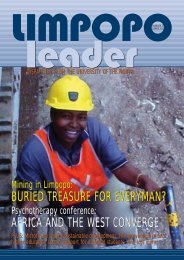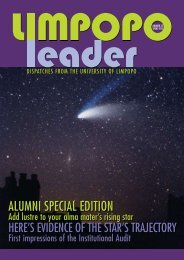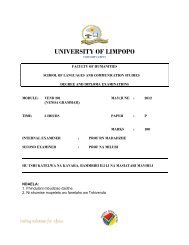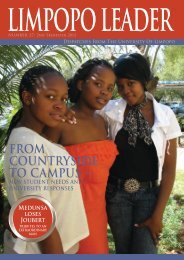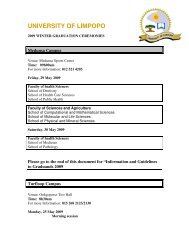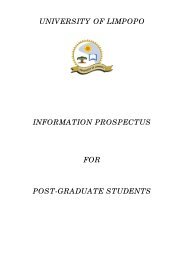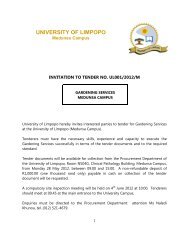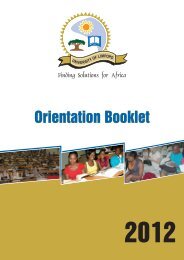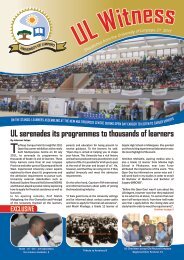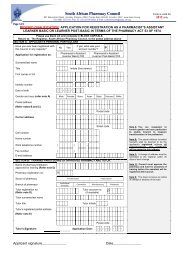Limpopo Leader - Spring 2005 - University of Limpopo
Limpopo Leader - Spring 2005 - University of Limpopo
Limpopo Leader - Spring 2005 - University of Limpopo
You also want an ePaper? Increase the reach of your titles
YUMPU automatically turns print PDFs into web optimized ePapers that Google loves.
SMALL VERSUS BIG – AN IMPORTANT AGRICULTURAL DEBATE<br />
scheme where a diversification <strong>of</strong><br />
livelihoods (including dairy goats<br />
and eco-tourism) is being<br />
developed. The third site is the<br />
Makg<strong>of</strong>e Trust Farm on which<br />
emerging small-scale farmers are<br />
working on redistributed land with<br />
broiler chickens and vegetables.<br />
The research is carried out<br />
by CRCE interns who are postgraduate<br />
students working<br />
towards their higher degrees.<br />
There are eight such interns for <strong>2005</strong>.<br />
Much <strong>of</strong> the documentation<br />
comes from the interns. The CRCE<br />
has a publishing programme that<br />
makes known the results <strong>of</strong> the<br />
research. The CRCE also<br />
produces regular video material<br />
on aspects <strong>of</strong> its work. These<br />
videos are used not only as an<br />
extension tool but are also aired<br />
at national and international<br />
forums. The CRCE is now widely<br />
recognised as an authority in<br />
this field, and the training <strong>of</strong><br />
agricultural extension <strong>of</strong>ficers<br />
as executive producers <strong>of</strong> TV<br />
programmes regularly takes place.<br />
Networking is <strong>of</strong> fundamental<br />
importance to the work <strong>of</strong> the<br />
CRCE. Relationships have been<br />
built up with many national and<br />
provincial bodies, and the<br />
international links reach deep<br />
into Africa. In October last year,<br />
a memorandum <strong>of</strong> understanding<br />
was signed between the<br />
universities <strong>of</strong> <strong>Limpopo</strong> and<br />
Tanzania that focuses particularly<br />
on animal science and<br />
agricultural economics and<br />
promotes joint activities and<br />
joint research between the two<br />
institutions.<br />
Other African linkages include:<br />
• One with Pelum (Participatory<br />
Ecological Land-Use<br />
Management), a civil society<br />
network in East, Central and<br />
Southern Africa promoting<br />
sustainable communities.<br />
• Another one with Prolinnova,<br />
(Promoting Local Innovation)<br />
a network <strong>of</strong> pr<strong>of</strong>essionals<br />
from research, academic and<br />
development circles aimed<br />
at supporting genuine local<br />
innovations that improve rural<br />
livelihoods.<br />
• And another with the East and<br />
Southern African Farmers’<br />
Forum, an organisation<br />
committed to enabling small<br />
farmers in the region ‘to speak<br />
as a united voice so that<br />
the issues, concerns and<br />
recommendations <strong>of</strong> farmers<br />
becomes an integral part <strong>of</strong><br />
policies and practices at<br />
national, regional and<br />
international levels’.<br />
One <strong>of</strong> the CRCE interns is<br />
currently doing postgraduate<br />
research on the process <strong>of</strong><br />
networking among small-scale<br />
farmers. What functions do the<br />
networking processes fulfil? How<br />
effective are they in breaking<br />
through the restrictions <strong>of</strong> localised<br />
groups? Does horizontal communication<br />
at the local or district level<br />
help with the central issues <strong>of</strong><br />
efficiency and sustainability?<br />
‘Essentially,’ says Lassalle, ‘we<br />
are concerned with promoting<br />
innovation in small-scale agriculture<br />
because it is this branch <strong>of</strong> farming<br />
– much more than huge endeav-<br />
ours with inputs measured in millions<br />
<strong>of</strong> rands – that describes the<br />
sustainable future <strong>of</strong> the developing<br />
world. There are plenty <strong>of</strong><br />
examples <strong>of</strong> large endeavours<br />
ruining the sustainability <strong>of</strong> the<br />
land and breaking the viability <strong>of</strong><br />
a region’s small farmers.<br />
Agriculture should be about the<br />
people on the land, and not only<br />
about outputs measured in tons.’<br />
So the future is going to be<br />
dominated by small-scale farming<br />
concepts like organic, humanbased,<br />
ecologically sustainable,<br />
and so on. And these are the<br />
concepts that the CRCE is seeking<br />
to bring into the mainstream<br />
academic debates at the<br />
<strong>University</strong> <strong>of</strong> <strong>Limpopo</strong> as it<br />
increasingly focuses attention on<br />
the communities it serves – and<br />
indeed on the basic rural realities<br />
<strong>of</strong> the entire SADC region.<br />
P A G E 1 9



